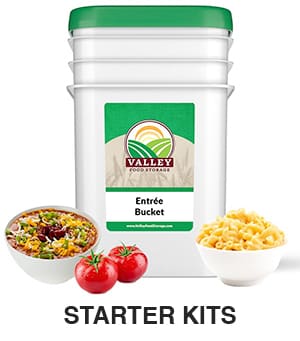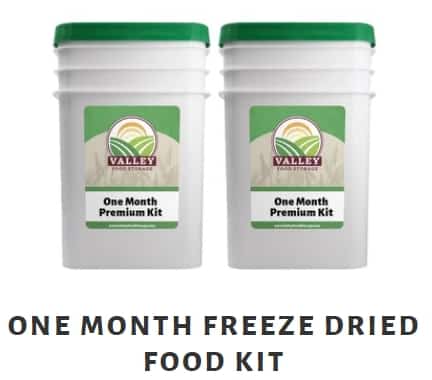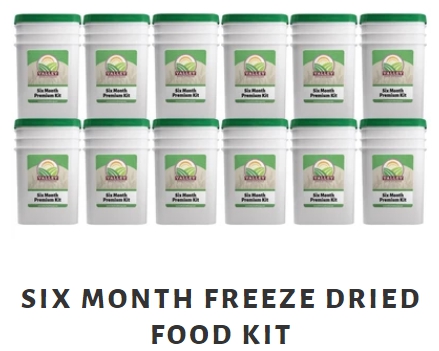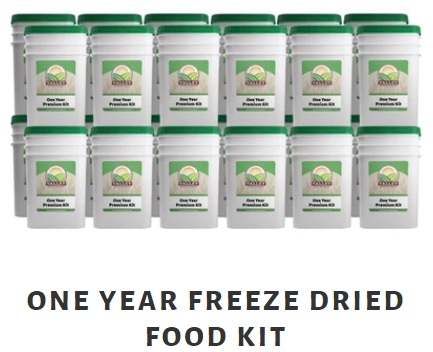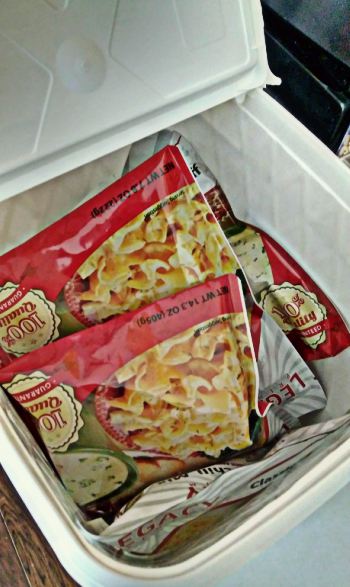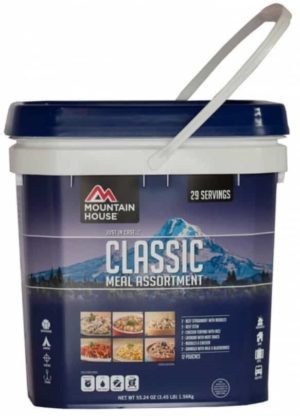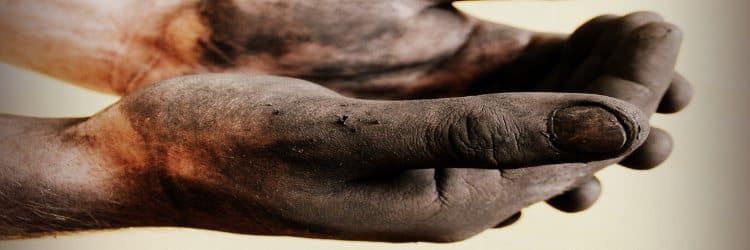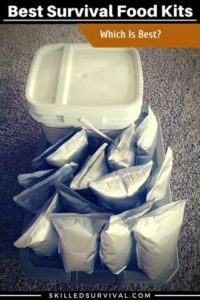
A Complete Guide To Finding The Best Survival Food Kit Deals
Because EVERY responsible adult should own survival food.
Why? Because stashing a few meals for when times get tough is wise.
Now FEMA recommends at least three days’ worth of food for emergencies.
But I think 3 days “an absolute bare minimum.”
THAT should only be a starting point…
To be resilient to life’s uncertainties, arm yourself with more than “the bare minimum.”
TOPICS IN THIS GUIDE… ↓(click to jump)
- Best Survival Food Kits Today
- What IS A Survival Food Kit?
- Best Survival Food Features
- Kits Are A Wise Investment
- Building A Kit On A Budget
- 5 Dangerous Food Kit Myths…
Survival Food Kits For An Emergency
Today, I’m going to share what I consider are the best.
ONLY the deals and kits that I’ve bought with my own money:
1. Valley Food Storage
Valley Food Storage is the first survival food company I bought from several years ago.
And I’m still pleased with my purchase!
Go here to see my review and taste test (or watch my review video below).
First, they have a wide range of kit sizes.
Everything from a small starter kit to a 1-year kit.
They also include breakfast, lunch and dinner options.
Most kits include freeze dried fruits and vegetables.
And ALL their kits come in hard plastic stackable buckets.
They exceed all quality marks and are a great survival food company.
You can’t go wrong with Valley Food Storage.
Here are a few of their most popular kits (by the length of supply):
*Note: All time estimates (1 month, 6 months, etc.) are based on 1 adult’s average daily calorie need.
If you're starting out, you'll want to check out Valley Food Storage's 72-Hour Food Kit.
It's an ideal starter kit at an affordable price and will provide nourishment for most short-term emergencies.
They use thick mylar bags with wide seals at the top.
This helps to ensure the bag remains closed to moisture and oxygen until you're ready to consume.
These starter kits are the perfect place to start building your food stockpile.
They are especially good if you're on a budget, and the larger kits are a little bit out of reach right now.
The food pouches are sealed inside hard plastic, stackable buckets.
These buckets help to ensure the food remains dry, provide excellent protection from vermin, and allow you to stack the buckets.
There are breakfast buckets, hurricane kits, blizzard kits, on-the-go kits, plus more to choose from.
This one-month food kit includes the same quality Mylar pouches that are in the 72-hour kit.
But there's one major difference: buckets.
The food pouches are sealed inside two hard plastic, stackable buckets.
These buckets help to ensure the food remains dry, provide excellent protection from vermin, and allow you to stack the buckets.
Now we're starting to develop serious resiliency to a food crisis.
This 3 Month's Kit will provide enough calories to keep someone well-fed for about 3 months. Again, this kit uses excellent Mylar pouches and buckets.
And these use the same high-quality ingredients as all Valley Food Storage freeze-dried survival meals.
Six months' worth of food sure seems like a lot, And for most emergencies, it is.
But if you take resiliency seriously, then it may be worth it to you to store this much.
Again, the same quality pouches, food, and buckets - just a whole lot more of them.
Of course, if you're extremely motivated, you increase your level of resiliency by stocking a year's worth of freeze-dried food.
A year's worth of food is my own personal target, and yes, it's overkill 99% of the time.
But if you get unlucky, you'll be sure glad you made this investment!
↓ Valley Food Storage Review (Long-Term Survival Food)
Legacy Food Storage is another quality survival food company. One I’ve personally reviewed and tested.
They also use a combination of freeze-dried food, mylar bags, and food buckets.
This helps ensure their food kits stay shelf-stable for decades to come.
Their kits start out at 60 servings all the way up to 4320 servings.
You can’t go wrong with Legacy Food Storage regarding quality food and price.
They also offer the “lowest cost per lb” of food and free shipping. Here are a few of their most popular kits by "the total number of servings":
60 Servings / 120 Servings / 240 Servings / 360 Servings / 720 Servings / 1440 Servings / 2880 Servings / 4320 Servings
And for those with dietary restrictions, they also have a few gluten-free kits:
↓ Legacy Food Storage: 72-Hour Family Kit Review
Mountain House freeze-dried food pouches are popular in the backpacking scene.
Why? Because freeze-dried food weighs a whole lot less than fresh foods – and they keep better!
This is another survival food brand I've bought from in the past and have reviewed.
Most food kits have a 25-year guarantee, but Mountain House has upped their "taste guarantee" to 30 years!
That's the longest guarantee I've ever come across in the survival food space.
Mountain House offers either pouches or buckets.
But my one gripe is they don't sell large quantities in buckets - so if you want to stock up, you'll need to buy more single buckets.
The bottom line is:
Mountain House is not the cheapest, but they are one of the best.
You can buy survival food from them with confidence; they're a fine choice.
↓ Mountain House Taste Testing
Augason Farms
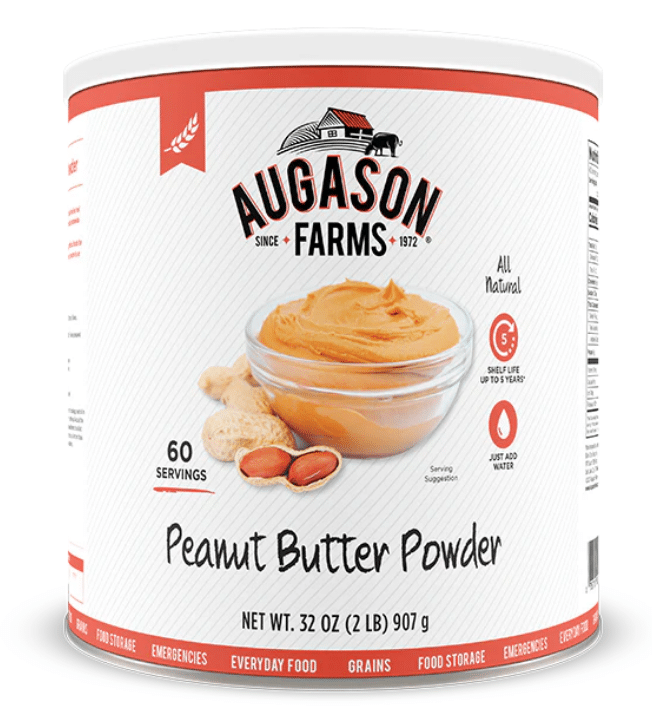
Now, I don’t have any personal experience with them.
But I know a lot of preppers I trust who swear by them.
They focus on selling number 10 cans in bulk.
Often it’s the ingredients you need to cook your own survival meals.
So the don’t sell “kits” in the traditional sense.
But they’re worth taking a closer look.
And shopping them for price comparison.
What Is Survival Food Anyway?
In the broadest sense, survival foods are a collection of non-perishables.
And kits are bundled offers.
So survival food kits come in different:
- Sizes
- Preparation methods
- And price points
They also come in different container options – from bags to buckets.
And once you start shopping, you’ll soon discover an endless number of options.
So, let’s break everything down.
Best Survival Food Kit Features (plus things to avoid)
First, NOT all emergency food kits are created equal…
The quality of meals is in the way the food is:
- Prepared
- AND how it’s sealed
Preparation Options
Freeze Drying
Preparing meals for long term storage often uses a technique called freeze-drying.
Freeze-drying is where nearly ALL moisture is removed from the food.
This is accomplished by using very low temperatures and sublimation.
↓ How Freeze Drying Works
Why is this good for longevity?
Because moisture a necessary ingredient for bacteria (i.e. mold growth).
No moisture, no mold.
Then we’re talking about the shelf life of decades (25 years +).
Plus, the process of freeze-drying allows the food to retain its original texture.
So adding the moisture back (by boiling it in water), the food reconstitutes.
The dried food absorbs the water.
And quickly return to a taste and texture similar to it’s original state.
Dehydration
Dehydration is another option.
But dehydration cannot remove as much water.
And the food won’t reconstitute as well.
So while dehydration is OK, it’s not the best.
What About MREs?
MRE’s meals are individual wrapped meals, packed and sealed in Mylar bags.
MREs have a longer shelf life than fresh foods.
But no where close to as long as freeze-dried foods.
For comparison:
- MREs typically have a stable shelf life of anywhere from 1 – 5 years.
- Freeze dried meals have at least a 25-year shelf life!
Sealing & Storage Options
There are several food storage options:
Mylar Bags
Mylar bags are a staple in emergency food storage.
They were originally known as BoPEt film.
This film was invented by Dupont in the mid-1950s.
And since, was quickly adopted by NASA.
That’s why Mylar is sometimes called “space blankets.”
They’re basically thin sheets of special foil that’s “unbreathable.”
That means once sealed; air molecules cannot pass through.
So once air and moisture are removed from inside the Mylar, it says out!
Forever.
Organic materials need 3 basic ingredients to begin growth.
- Organic material (food)
- Oxygen
- Water
So food can’t spoil in an environment where mold cannot grow, right?
Without moisture and oxygen – mold cannot do its thing.
So, with a Mylar bag, you’re putting very dry foods into a bag and sealing them up.
No moisture can pass through the Mylar bag walls.
This keeps harmful moisture out – until you’re ready to eat it.
But here’s the deal:
You can also toss an oxygen absorber into the bag with the food.
These magical packets absorb oxygen within the bag.
Leaving the inside of the bag void of of oxygen for mold growth.
It’s a one, two punch to keep your meals shelf stable for decades…
But Mylar bags by themselves are NOT enough.
Why? Because desperate vermin can chew through these bags.
And that’s where thick food-grade buckets come into play.
Thick Plastic Food Grade Buckets / Tubs
To protect your food from gnawing, put the Mylar bags into thick plastic food buckets.
Bucket storage also provides a few other benefits.
First, the food becomes stackable.
So you can stack them from floor to ceiling.
This saves a space in your pantry or basement.
Another benefit is most have a robust carry handle.
Now, most people won’t move their emergency food supply often.
But remember…they last decades.
So, who knows what may happen over the years – let alone decades?
- You might move to a new house
- Or you might need to relocate them
And if you’re ever forced to evacuate, a bucket with a handle means you can take some with you.
Affordability / Price
Of course, with most things, you get what you pay for…
But with survival kits, careful shopping can pay off big time.
For example:
There are often bulk discounts to be had.
And sometimes, you can get a “free” sample kit to try.
But be careful.
It’s easy to focus only on price.
But there’s a lot of misleading info in the survival space.
EVEYRONE is jockeying to be the “best emergency food supply”.
Or they add extra incentives to get you to buy.
And sometimes, these incentives are great.
But make sure you’re not getting duped.
Price is always a variable but NOT the ONLY one.
The bottom line is:
IF you understand what you’re getting, you can choose the RIGHT kit for YOU.
And it may be one of the best investments you’ll ever make…
↓ Preppers Stockpiling Food? Don’t Make These Mistakes…
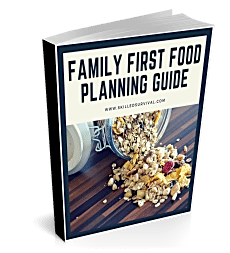
Want a free family-first food planning guide?
Enter your email below to instantly download this Complete Guide PDF. No purchase necessary. 👇 👇Why Survival Food Is A Wise Investment
Here’s the deal:
The future is uncertain.
And history is full of horrific disasters…
Whether it’s a natural disaster or a country decides it’s a good idea to destroy another…
Regardless of the event…
It’s a fact; the future is unpredictable.
That’s why survival kits are so important to prepping.
- They’re something resilient people embrace and take seriously.
- And they’re something the fragile masses tend to ignore.
Or worst, assume bad things will never happen to them.
And the more prepper food you own, the more resilient you become.
Why? Because while 72 hours is better than nothing,
Disasters don’t follow such protocols.
72 hours will work for MOST emergencies BUT not all…
Recent history is full of massive famines that lasted much longer than “72 hours”:
- Great Famine – Ireland (1845 – 1853) – 1.5 million dead
- Vietnamese Famine of 1945 – 2 million dead
- North Korean Famine (1994 – 1998) – 3 million dead
- Russian Famine of 1921 – 5 million dead
- Bengal Famine of 1943 – 7 million dead
- Bengal Famine of 1770 – 10 million dead
- Soviet Famine (1932 – 1933) – 10 million dead
- Chalisa Famine of 1783 – 11 million dead
- Chinese Famine of 1907 – 25 million dead
- Great Chinese Famine (1932 – 1933) – 43 million dead
I don’t know about you, but I’m unwilling to roll the dice on starvation.
It’s a horrific way to die!
↓ The Worst Droughts And Famine In History
And sure, the odds are unlikely any of us will experience THAT level of starvation in our lifetimes.
But even at low odds, it’s not impossible.
How much are you willing to bet you’re right? Your life?
People spend thousands of dollars on home and car insurance.
But avoid buying something more important, “Food Insurance.”
When you buy car insurance, you’re taking the side of the bet that says,
I’m betting I’ll have an accident in the next 6 months.
Your insurance company is taking the other side of the bet
“You WON’T have an accident in the next 6 months.
And the insurance company is usually right.
THAT’s how they make money.
But even though they’re usually right, you’re still unwilling to take the gamble.
Because if you lose, it means serious financial hardship…
But with starvation – it’s not a financial hardship we’re talking about…
It’s a slow, horrible, painful DEATH!
↓ Cheap Disaster Insurance – YOU Protecting Yourself
This FACT changes EVERYTHING.
You must protect yourself even with tiny odds.
Because while the odds are small, they are not impossible.
And the downside is too great.
People “think” they’re good at calculating odds (we’re not).
But we’re even worse at seeing the real downside of black swan events.
- There are minor bad events (like a car wreck, hail damage, etc.).
- But then there are life-shattering bad events (like mass starvation).
When the downside is starvation, it trumps the “odds” every time.
So here’s the deal:
Investing in “food insurance,” (a.k.a. survival meals) is a one-time investment.
One that will last the rest of your life (30 years).
As opposed to car insurance, an investment you regularly pay (monthly or yearly).
So, in contrast, you can spend a one-time investment on food…
And get a lifetime of starvation protection!
Sign me up!
And if it pays out?
It’ll be the BEST investment I’ll ever make.
And it won’t even be close.
If a stock you buy goes up 10% per year for 30 years, it’s a fantastic investment, right?
You have more money to spend on more “stuff”. Woo-hoo!
But, IF your “one-time food investment” pays off, YOU get to avoid STARVATION!!
So which investment has a better ROI?
EVERYONE should invest in more survival food.

Want a free family-first food planning guide?
Enter your email below to instantly download this Complete Guide PDF. No purchase necessary. 👇 👇How To Build A DIY Survival Food Kit
Now, you may be thinking…. hey, maybe I can do this myself.
And you’d be right; you ABSOLUTELY can.
But if you want to make your own freeze-dried foods in not easy.
You’ll need to invest in a home freeze-dryer machine.
And freeze dryers are expensive.
They cost way more than most countertop appliances (like a food dehydrator).
A small freeze dryer will cost at least $1600.
For some, that’s no big deal.
But for most, that’s a HUGE hurdle.
- Now, you could use the freeze dryer to start your own food shop
- Or you could get a few friends to “share” the cost
But you’d still need to buy:
- Mylar bags
- Oxygen absorbers
- And food-grade buckets
Your other DIY option is NOT to freeze-dry.
Instead, focus on storing dehydrated foods.
And this can work OK IF you plan to rotate.
If you consume what you make and replace it often, you rotating your stockpile.
But again, this adds another layer of hassle, complexity, and organizational skills.
So, if you’re up for it, DIY your prepper stockpile.
But either way, it’ll be an investment in TIME or MONEY…
You get to choose!
↓ Cheap DIY Emergency Long-Term Food Storage!
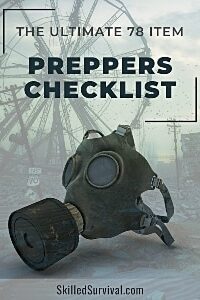
Want a free 78 item preppers checklist?
Enter your email below to instantly download this Complete Checklist PDF. No purchase necessary. 👇 👇5 Dangerous Survival Food Kit Myths…
Let’s bust some myths about survival food kits!
Because there’s a lot of confusion out there.
Myth #1: “All Survival Food Kits are the Same”
They come in all shapes and sizes.
And the quality can vary like night and day.
Some kits are loaded with essential nutrients and calories, while others are filled with empty carbs.
You’ve got to do your homework and pick the right one for your needs.
Myth #2: “Survival Food Tastes Like Cardboard”
Sure, there used to be some less-than-tasty options out there.
But times have changed…
Nowadays, you can find survival food that actually tastes pretty darn good.
Manufacturers have stepped up their game, and you can enjoy a variety of flavors while you’re out there surviving.
Myth #3: “MREs Are All You Need”
Now, MREs (Meals Ready to Eat) have their place.
But relying solely on them for an extended period is a recipe for disaster.
They lack the longevity of freeze dried foods.
And are usually MORE expensive on a per calorie basis.
Myth #4: “Survival Food Kits Last Forever”
While some kits have a long shelf life, they don’t last forever.
Eventually, they’ll lose flavor and nutritional value.
Be sure to check those expiration dates and rotate your stock to keep your food fresh.
Myth #5: “They’re Just for Doomsday Preppers”
You don’t have to be a doomsday prepper.
Natural disasters, power outages, and unexpected emergencies happen to folks from all walks of life.
Having a stash of survival food is just plain smart.
And it can be a real lifesaver when the unexpected hits.
Final Thoughts
Every year, you buy life insurance and PRAY you never have to use it.
And generally, we’re OK with this setup.
The same goes for food insurance.
You buy it and HOPE and PRAY you never need to use it!
And at the end of 30 years, if the food is still sitting there on the shelf, you get to eat it and enjoy it.
Because nowadays, freeze-dried survival meals taste great.
So, no matter what, an investment in survival food kits will never be a waste!
And there are no do-overs in survival.
Woulda, coulda, shoulda won’t fill your family’s bellies in times of crisis.

Prepare, Adapt & Overcome,
P.s. - I just found out 2 out of 3 Americans don’t feel prepared for a 3 day disaster!!!
I guess this goes to show how modern society continues to embrace ‘living a fragile life.’ What’s crazy is… it’s so easy to fix.
To make sure YOU have the basics, watch our FREE training on “10 Simple Steps To Basic Preparedness” that shows you HOW.
Nothing crazy here… this isn’t doomsday prepping... just the basics every responsible adult should have before a disaster strikes.Why You Can Trust Skilled Survival...
Go here now to review a full breakdown of:
- Who We Are
- Our Credentials
- Our Mission
- & Product Recommendations...
Here are a few highlights of our teams credentials & certifications:
- Certified Member of a Mountain Search & Rescue Organization
- Plant Emergency & Safety Leader for a Major Food Manufacturer
- Member of the 10TH Mountain Division Hut Association
- Certifications: Avalanche 1, WFR, CPR
- Official Gear Tester for Numerous Outdoor Gear Companies
- Countless Multiday Backpacking trips into Remote Wilderness
- Bachelor's Degree In Mechanical Engineering
- Bachelor's Degree In Civil Engineering
- Bachelor's Degree In Biomedical Engineering
"It takes 20 years to build a reputation and five minutes to ruin it." - Warren Buffett
We're fully aware that trust is NOT something you GET but is EARNED.
And we'll continue to earn YOUR trust through our forthright and honest approach with each new Blog Post, Guide & Product we create...
P.s - I just took this FREE 60-second 'Readiness Score Quiz'👇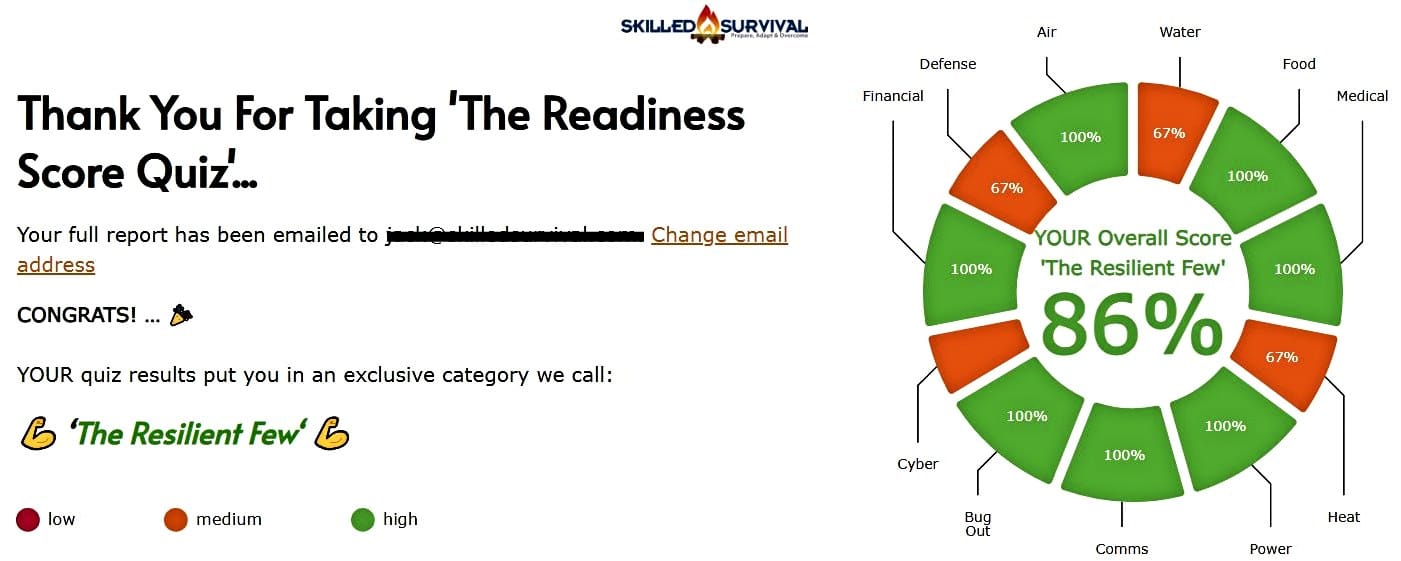
AND... I've still got a few gaps in my preps...🤔 But at least, I'm not part of 'The Fragile Masses'. 👍 Find out where YOU stand by answering a few questions...
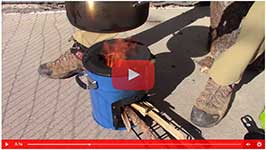
Recommended Reading
Emergency Food Storage When Calories Become Scarce
Building your emergency food storage doesn't have to be complicated. We break things down into simple steps to help you do it right.
The Most Nutritious Survival Foods You’ll Actually Love
What are the best survival foods? It depends on your goals. We look at different scenarios to help you stockpile the best emergency foods.
Dehydrating Fruit: How To Preserve Sweet Calories
Dehydrating fruit is a great way to store tasty calories for long-term storage. We should you the best way to dehydrate some for emergencies.
Unique Food Storage Ideas: The Most Surprising Locations
Want a large emergency food stockpile but living in cramped quarters? Don't let this ruin your preparedness passion! Try these unique food storage ideas.
Prepper Food: Best Ones to Stockpile For Emergencies
What's the worst-case scenario if you choose NOT to stockpile any food? Starvation. That's why investing in prepper food is so wise.
Valley Food Storage Review: An Expert Puts It To The Test
Unbiased and thorough Valley Food Storage review covering food supplies, packaging, taste, and shelf life. Don't buy without reading this...


